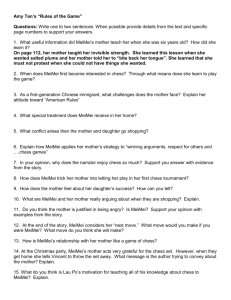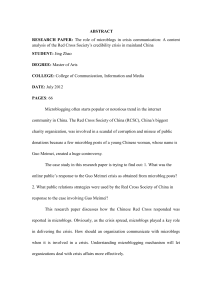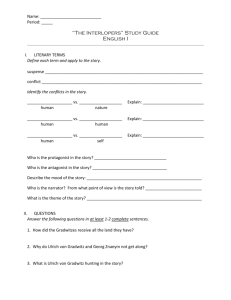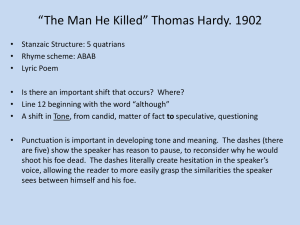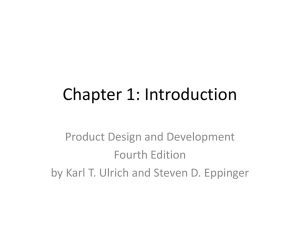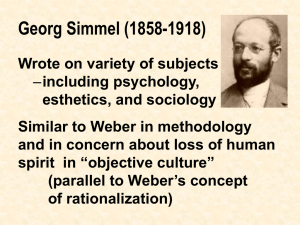Gold Literature Test Three file
advertisement
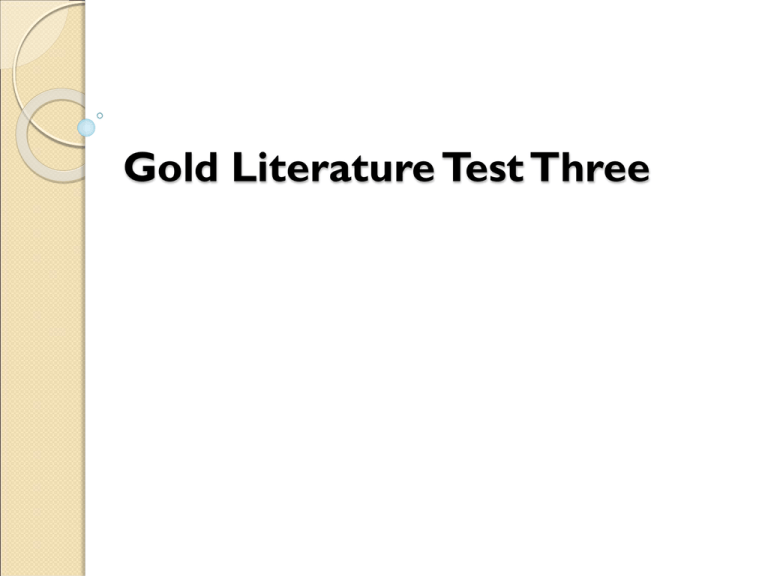
Gold Literature Test Three Meimei’s mother believes it’s important for her daughter to figure out the chess rules herself to compete successfully in America Meimei tell her mother she doesn’t want to play in the local tournament because “they would have American rules” as a strategy so her mother will let her play. Meimei finds Mrs. Jong’s behavior in the shops so embarrassing because Meimei feels she is being paraded around to make her mother look good. The statement that represents the principal cause of conflict between Meimei and Mrs. Jong is “Meimei understands ___________________________”; Mrs. Jong does not. and wants to live by “American rules The real significance of Meimei’s success for her mother is that Meimei achieves the success within the American system that her mother cannot. The girl in “Checkouts” is unhappy at the beginning of the story because she has been forced to move. When the narrator of “Checkouts” says, “It is a difficult work, suffering, and in its own way, a kind of art,” she means the girl is exaggerating her grief. The girl likes to shop for groceries because she can be alone with her thoughts. When the narrator says that it was not safe for the girl’s parents to know her inner thoughts, she means the girl felt that her parents could not understand her. She wants to see the bag boy again because his awkwardness __________ with her perfect house. contrasts The irony of the ending of “Checkouts” is that they never get together and she adjusts easily. At the beginning of the poem, the narrator of “Fifteen” finds a wrecked but running motorcycle. The boy in “Fifteen” considers riding off on the motorcycle. The speaker in “Sympathy” __________ how the caged bird feels. understands In “Sympathy,” the bird beating its wings against the bars of the cage is a symbol of useless struggle. The “dawn-bright lawn” in “Caged Bird” symbolizes a new beginning. The speaker in “We never know how high we are” believes that dreaming enables us to achieve greatness. In “We never know how high we are,” the skies symbolize limitless possibility. In In My Place, many white students reacted to Charlayne Hunter-Gault’s first day on the University of Georgia campus by forming mobs and staging a riot. At the beginning of the story, Ulrich is portrayed as angry and hoping to find his enemy. Suspecting that ________________ in the forest prompted Ulrich to go into the woods on the night of the story. Georg would be poaching The result of an internal conflict is that Ulrich _________________ Georg when they meet. does not shoot Ulrich and Georg’s feelings toward each other change during the story from hatred to friendship. Ulrich _______________ when he sees the figures coming down the hill. cries out in joy The first indication that the men may end the feud is that Ulrich offers Georg a drink of his wine. The cause of conflict between the von Gradwitz family and the Znaeym family is a land dispute, and the effect of this conflict is years of feuding between the families. An example of external conflict is when Ulrich threatens Georg. When Michener first views Zaqir’s rugs he notices right away that they are strikingly beautiful. Readers can infer from Zaqir’s repeated visits to Michener’s hotel that Zaqir is persistent. Zaqir is willing to give Michener the rugs and wait for payment. This reveals that Zaqir is _________ and able to recognize an honest person. trusting Michener has no checks and feels distressed that he cannot accept Zaqir’s bargain price for four rugs. His distress shows Zaqir’s abilities as a salesperson. Michener had been totally against buying rugs, but Zaqir is _____________ in just a few days. able to change his mind The details from the story reveals Michener’s trust in Zaqir because over the course of five years, he continues to send payments for the shipment of the rugs. The reason for Zaqir’s delay in depositing the check was that he was using the check as an advertisement. The rugs seem to hold special meaning for Michener because they remind him of Zaqir. The speaker in Gladys Cardiff’s “Combing” considers women’s relationships while combing her daughter’s hair. The best explanation of the meaning of “Combing” is that through acts as simple as combing hair, women are bound to each other through time. When Walker writes about how women led “Across mined / Fields / Boobytrapped / Ditches” she is referring to the danger of pursuing education in the segregated South. At the end of “Women,” the poet points out that the women’s efforts toward education were all the more remarkable because they _________ deeply without having it. valued education In “maggie and milly and mollie and may,” when “molly was chased by a horrible thing,” the thing she saw was probably a crab. When the speaker in “Astonishment” says “At home, not in a nest,” she means why was I born human and not a bird? When the speaker in “Astonishment” considers her life after “many epochs of absence,” she means that she was not ______________ before her life. here in all time The point that the speaker of “Astonishment” questions about her existence is its randomness. You can find a link to this powerpoint on my lesson plan website.
